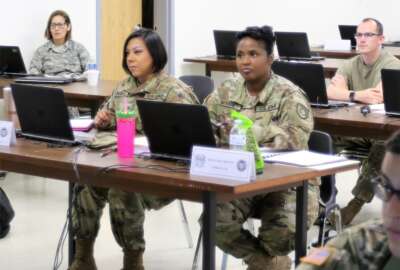Military transition programs focus on education rather than employment
Oversight of all federally-funded transition programs is “weak and fragmented,” and there is little evidence that transition employment programs are effective.
Nearly all military-to-civilian transition programs are focused on upskilling, retraining or education rather than on helping service members and veterans find employment, a new study finds.
The Rand Corp. looked into how nearly $13 billion is spent annually on these transition programs, specifically how the funding is allocated, where the potential overlaps between the programs are and if the programs are effective.
The researchers found that most of the federal budget set aside for these transition programs goes toward educational assistance and that there are almost no resources beyond the Defense Department’s Transition Assistance Program available to service members and veterans that assist with obtaining employment.
The report comes as college tuition fees continue to inch up year after year while a growing number of Americans are opting out of college — undergraduate enrollment in 2021 was 15% lower than in 2010.
“Dedicating significant portions of the transition budget [to education] is also unsurprising because of the high and growing costs of college. However, many veterans want or need to move directly into employment,” the report says.
For this study, the researchers examined 45 transition programs that are overseen by 11 agencies across the federal government, including major budgetary program such as the Post-9/11 GI Bill, DoD’s Tuition Assistance Program and Veteran Readiness and Employment, and smaller programs such as the Montgomery GI Bill and the DoD’s Transition Assistance Program.
Due to the involvement of various agencies, the researchers found that oversight of all these 45 federally-funded programs is “weak and fragmented,” and one of the outcomes of poor oversight is numerous redundancies in these programs and services. For example, the Post-9/11 GI Bill, one of the largest transition programs, provides limited information on how effective the program is, specifically how many service members and veterans use it and how many of them graduate from the program.
“This finding could be because oversight of these programs is fragmented; numerous congressional committees are responsible for overseeing portions of some programs, and various federal agencies are involved in operating these programs,” the report states.
In addition, there is not enough evidence to support that these federally-funded employment transition programs are effective at all.
In fact, the researchers found that the DoD’s Transition Assistance Program participants experience lower wage growth where they earn $1,974 less than non-participants at 6 months post-separation, $1,362 less at 24 months post-separation and $1,238 less at 36 months post-separation.
Similarly, student veterans participating in the Post-9/11 GI Bill program also saw lower earnings after leaving the service. In some instances, it has even led to negative returns on investment in education.
Meanwhile, smaller programs don’t have enough reported data to determine their effectiveness.
“The most notable gap is the paucity of program evaluations. Although there have been congressionally mandated assessments of some programs, much of the information we find on program effectiveness comes from small-scale or otherwise limited studies,” the report states.
The researchers suggested that Congress needs to get involved and mandate consistent budget reporting for all military-to-civilian programs, not just the ones assisting with finding employment.
“There is a need for policymaker intervention to require agencies to standardize their budget and performance reporting—a mandate that should not be limited to programs that support employment transitions. As we have attempted to update those findings, we often find outdated and conflicting budgetary information, even for large programs,” the report reads.
Copyright © 2025 Federal News Network. All rights reserved. This website is not intended for users located within the European Economic Area.







